Oberlin Alumni Magazine
Spring 2009 Vol. 104 No. 3
A Mid-Winter’s Daydream
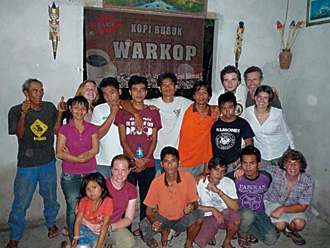 Katharine Sontag, back row, second from left, in Indonesia with new friends.
Katharine Sontag, back row, second from left, in Indonesia with new friends.
An Oberlin senior’s winter term took her to Indonesia—and someplace farther.
I feel at least once a day like I am in a dream. I wake up to sounds of roosters at 4:30 in the morning. I eat at least nine bananas a day. I watch the same soap opera every night in a language I don’t understand. I hike all the time, sometimes in groups and sometimes alone. Everyone asks, "Where are you going?" Jalan jalan, we answer: Just taking a walk.
The clouds are so beautiful here. Once I sat and wrote about them all morning. I’ve only done that once before, and it was on a plane. Then I was in a cloud and now I am in a cloud, too, but not because I’m in a large machine that flies in the sky but because we are just really high up all the time here in Indonesia. When it’s about to rain, the clouds blend into one massive fog. It rains at least once a day, sometimes all day and night but usually just really hard for a little while. There are only two seasons here: dry and rainy. January is the heart of the rainy season.
I never thought to go to Indonesia. My senior winter term was going to be about "my future." That’s all anyone talked about. Then in poured a flood of applications, cover letters, important decisions and I found myself drowning in it all. I got an e-mail from the Community Service Resource Center, part of the College’s Bonner Center for Service and Learning, and the name Mark Merrett was on it. Mark is the father of Sam Merrett ’05, the founder of Full Circle Fuels, Oberlin’s first alternative fuel station. Mark’s e-mail said he was taking six students to Nusa Penida, an island off the coast of Bali where he had a house, to work on community projects. I applied. I wanted to see another way to live, because this one was overwhelming me. So I joined Sara Schaffer ’10, Andrew Fenster ’11, Trevor Rhoads ’10, Rebecca Uhlman ’12, and Cory Boberg ’10.
Now that I’m here, I’ve forgotten about all the practical things that dictate life at home, like money, work, stress, and caffeine. I drink tea, but it is weak and has a pound of sugar in it. I don’t use sugar at home, but here the sweetness is so sweet you can’t bear to give it up. All of my senses are amplified. Or maybe I’m just listening to them more or finally listening to them at all. Even the most mundane of acts—showering, eating, walking, and sleeping—have taken on new significance for me. I’m learning all the time. Everyone, American and Indonesian, teaches me something new just through our interactions. We discuss personal and important things, such as deep-seated religious beliefs and traumatic experiences. I am able to be open here, both with my fellow Oberlin students and our new Indonesian friends. We work together, carrying heavy stones to build the base of a village shrine; we eat together at the village warong; and we just hang out together, talking, laughing, sometimes even singing and dancing.
Sara and I teach English every other day for an hour. It doesn’t seem like much, but our planning is easily quadruple the amount of time we actually teach. Our students range from a young 4 to an old 13. Sometimes there are 30 and sometimes there are 12, it just depends on who feels like coming. We never know what activities will click and which ones will fall apart. They love "duck, duck, goose," and they greet us in English all the time now.
"I wanted to see another way to live, because this one was overwhelming me."
Last night we donned our sarongs and waist scarves and traveled all around the island in two pickup trucks, each packed with people—six Americans and the rest of the youth of the village. The air was so nourishing. We sang Indonesian songs and felt everything so intensely. We went from temple to temple. We stopped and prayed at each one. I have never prayed before but I have become accustomed to it: Kneel on the stone floor, right hand cupped over left, drink the water splashed into your hands three times, and toss it over your head on the fourth. Pick the rice from the basket in front of you, place some on your head and some on your neck. The priest murmurs a prayer. Now you are blessed.
That was our last night. We tried so hard to soak up as much as we could. It didn’t matter that we got home at midnight and would awake in six hours. We never wanted to leave. We never wanted to wake up from what could only feel like a dream.
Back home, the elation of Nusa Penida stayed with me for about two weeks. My body was here, but my mind was in Indonesia. I wasn’t worried. I wasn’t stressed, even when I had cause to be. But I had to re-assimilate into this world in order to function within it. Mark, who travels back and forth all the time, told me this would happen, but that I would still be changed, even just a little bit. I think he’s right.
Katharine Sontag ’09, an English major from Yonkers, is thinking about becoming a writer.
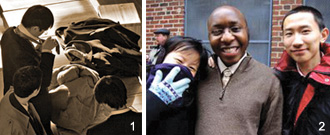 (1) photo by Leo Charette, (2) photo by Samantha Lansford ’09
(1) photo by Leo Charette, (2) photo by Samantha Lansford ’09
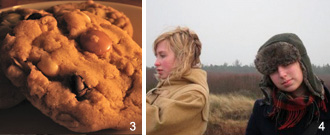 (3) photo by Gabriele Johnson ’09, (4) photo by Madalyn Berg ’12
(3) photo by Gabriele Johnson ’09, (4) photo by Madalyn Berg ’12
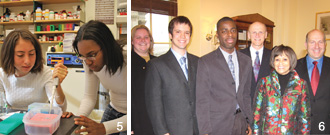 (5) photo by Yvonne Gay Fowler
(5) photo by Yvonne Gay Fowler
Four Decades Beyond the Classroom: Winter Term Turns 40
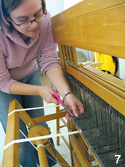
photo by Alia Kate ’07
For four decades, winter term has presented Oberlin students the opportunity to explore interests beyond the classroom, often something beyond their usual interest or comfort zone, and sometimes well beyond the ordinary. This year was no exception, as 2,350 students fanned out across town and across the world.
(1) Oberlin students from the Business Scholars program, who met with business leaders in New York, Boston, and Cleveland, practice tying double-Windsor necktie knots as part of a "Dress for Success" seminar at Brooks Brothers in New York.
(2) Jo Ling Goh ’09, Emmanuel Magara ’11, and Lechi "Fox" Zhang ’12, also part of the Business Scholars program, in New York City.
(3) Vegan "Monster Cookies" baked by Gabriele Johnson ’09, who spent winter term sharpening her cooking skills while studying the science of vegan cooking. (For recipe and cooking tips, visit her blog: http://vegancooking101.blogspot.com).
(4) Meredith "Cubby" Dimling ’11 and Alison Karasyk ’12, among the eight Oberlin students who studied sustainable design in the Netherlands with professors Susan Umbenhour and Don Harvey in a project called "Oberlin SlowLab," on a walk toward a beach they never quite reached.
(5) Joanna Johnson ’11 and Ria Richardson ’09, who spent January in the biology lab, apply primary antibody to opossum uterus tissue, a step in the process of staining the tissue to observe progesterone receptors.
(6) Jordan King ’11, Ian Seeley ’11, and George Omos ’10, interns in Speaker of the House Nancy Pelosi’s Washington, D.C., office for winter term, pose with Pelosi’s chief of staff John Lawrence ’70, Sandra Hodge, Oberlin College’s special assistant for community and government relations, and President Marvin Krislov.
(7) Ondrea Keith ’10, one of 10 students who took part in the project "From Yarn to Garment," for which they were to design and create at least one wearable garment, is shown trimming the thread on the fabric she made.
